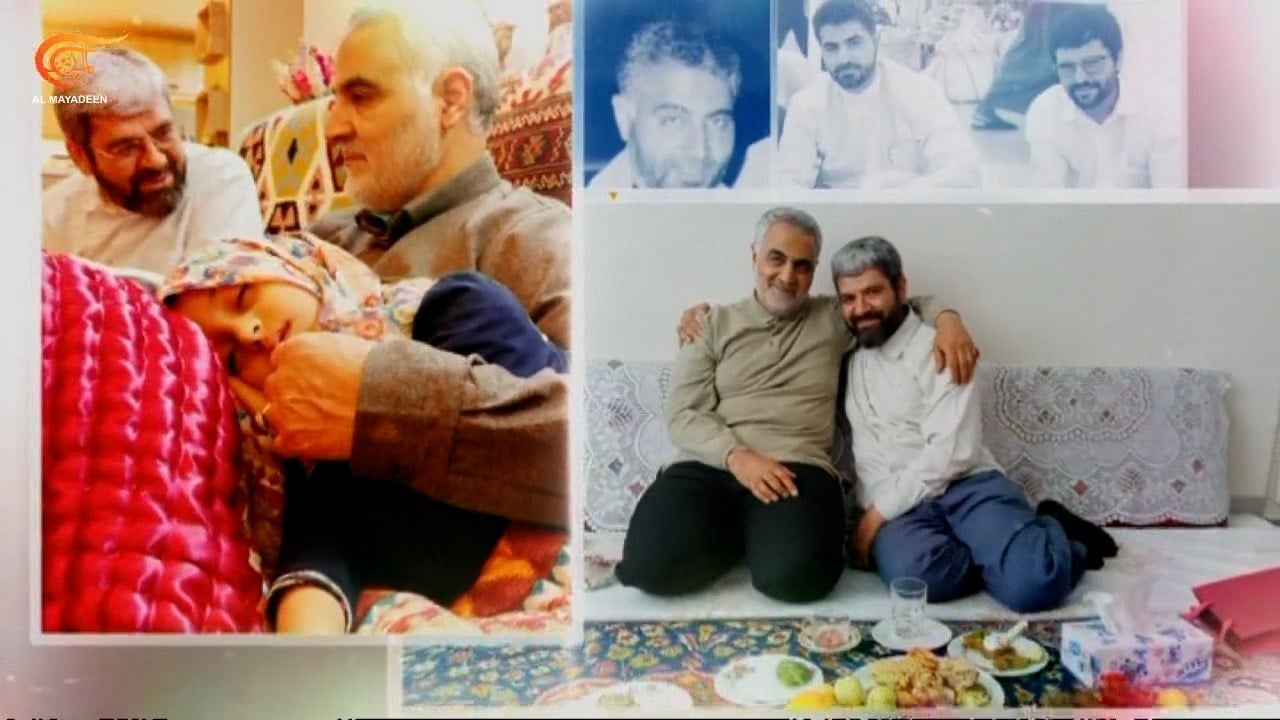A memory for life; how Soleimani’s friend remembers him: Exclusive
Martyr Qassem Soleimani's close friend relates to Al Mayadeen his memories with the Iranian leader for the first time; so what did he say three years after his departure?
-

Soleimani with his long-time friend, Mahmoud Khaleqi
Three years on… on the anniversary of the assassination of the two leaders, Qassem Soleimani and Abu Mahdi Al-Muhandis, Al Mayadeen conducted an interview with the former’s close friend Mahmoud Khaleqi. What did he say about Soleimani? What was the will he left behind? How did he spend his last days with him before he was martyred?
How he received the news of his martyrdom
"I felt that the whole world was crumbling around me."
This is how Mahmoud Khaleqi, a close friend of Martyr Qassem Soleimani, describes the news of the latter's martyrdom. He adds that he received the news of his martyrdom from a friend. Afterward, he headed to Soleimani's house in Tehran to follow up on matters from there.
On their friendship, Khaleqi says it dates back to 1985, and it was strengthened in 1992 when they headed to Mecca to perform the Hajj act of worship. He adds that on the 18th of Thul-Hijjah, which coincides with the occasion of Eid Al-Ghadir, and in the Sacred Mosque and in front of the Kaaba, "we made the brotherhood promise, and we pledged to always meet in this world."
Khaleqi had a lot to say about his long-time friend. He describes him as "a person with a high heart and full of kindness, who was the best friend and companion," adding that he cared about the smallest details of his personal life and gave him honest advice and help.
As for his personal qualities, Khaleqi says Martyr Soleimani was renowned for his honesty, sincerity, altruism, courage, and good manners, with a great focus on people's problems and concerns.
Regarding his journey during the Holy Defense period, Khaleqi says, "Hajj Qassem was feeling physically tired, and he was also suffering from headaches and had lung problems due to the freedom-fighting track he undertook."
He adds that sometimes when Soleimani was overwhelmed with work and responsibilities, his body would no longer be able to follow up with him. But from a psychological and spiritual point of view, he was a strong, self-made person.
Read more: President Raisi reveals why he held Soleimani's photo at UN
What was the will Soleimani left behind?
Khaleqi says that in the early nineties of the last century, Soleimani spoke to him for the first time about his shrouding and burial when they were visiting the cemetery of the martyrs of the city of Kerman. He notes that "Martyr Soleimani used to sit in the same place where he is currently buried, i.e., next to the shrine of Martyr Commander Hossein Yousef Saif Elahi."
He adds that at that time, Soleimani told him, "If I die or was martyred, let this place here be my final resting place," asking to be buried right next to Martyr Saif Elahi. Khaleqi continues to say that Soleimani asked him several times to be the one who shrouds and lays him down in the grave upon his martyrdom. He also asked him to bury the ring he prayed with along with him, in addition to a piece of cloth signed by religious references and scholars, which attests to his good conduct, as his friend recalls.
"A decapitated body"
Khaleqi stresses that everyone thought that the martyr's body was complete, "because there was no opportunity to open the shroud completely and there was no need for that, so we did not do it."
He confirms that Martyr Soleimani’s head was separated from his body. Khaleqi recalls how he buried his brother Martyr Mohammad 32 years ago, in 1986, explaining that his head was separated from his body, and so was the case of Martyr Soleimani.
He got what he wanted; martyrdom
Khaleqi says, "Hajj Qassem wished for martyrdom." His friend recalls how he used to ask everyone he met to pray for him to die as a martyr and not a normal death.
"And he got what he wanted," Khaleqi confirms.
He continues to say, "His martyrdom came in a situation that no one could have ever thought of," as it came when his most beloved bits and pieces came together. "He was martyred on the blessed Friday eve, on the [sacred] land of Iraq, and with [his long-time companion] Abu Mahdi Al-Muhandis, along with his righteous companions, in addition to how he was martyred, not to mention the majestic funeral that was held for him," Khaleqi recalls.
Read more: Iran: Indictment on case of Martyr Soleimani's assassination near
Four nights prior to his eternal departure
Khaleqi tells Al Mayadeen how four nights before his martyrdom, Martyr Soleimani came to the city of Qom and how they spent several hours in the shrine of Sayyeda Fatima Al-Masouma performing prayers and making supplications. He adds that he insisted on accompanying Soleimani to Tehran, and 100 hours after they parted in front of his house in Tehran, he was martyred.
Regarding the conversation that took place between them, Khaleqi said, "It was a regular conversation about cognitive and ethical research and some local and foreign political affairs, in addition to family and personal matters."
At the end of his interview for Al Mayadeen, Khaleqi pointed out that Martyr Soleimani viewed all human beings on the basis of equality without any discrimination, stressing that if Soleimani was present today, he would be more than willing to sacrifice himself for everyone without exception because his love was not exclusively for religious people and Iran, but for all peoples.
Khaleqi called for taking Soleimani out of the political, partisan, and sectarian calculations and getting to know this all-inclusive person who sacrificed himself for the sake of everyone.
Read more: Soleimani's assassination legal case is being blocked by US officials

 6 Min Read
6 Min Read








